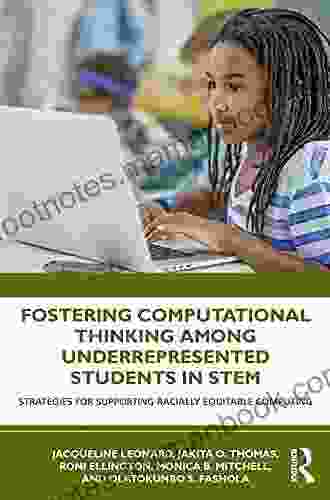Fostering Computational Thinking Among Underrepresented Students in STEM Fields

Computational thinking is a problem-solving approach that involves using computational concepts and techniques to solve problems and create solutions. It is an essential skill for success in the 21st century workforce, and it is particularly important for students who want to pursue careers in STEM fields.
5 out of 5
| Language | : | English |
| File size | : | 21400 KB |
| Text-to-Speech | : | Enabled |
| Screen Reader | : | Supported |
| Enhanced typesetting | : | Enabled |
| Word Wise | : | Enabled |
| Print length | : | 224 pages |
However, research shows that underrepresented students are less likely to have access to opportunities to learn about and develop computational thinking skills. This is due to a number of factors, including systemic racism, sexism, and classism. As a result, underrepresented students are less likely to pursue STEM careers, and they are less likely to be successful in those careers if they do.
It is essential to foster computational thinking among underrepresented students in order to create a more equitable and inclusive STEM education system. This article will discuss the importance of computational thinking and provide strategies for educators and policymakers to promote computational thinking and create a more inclusive STEM education system.
The Importance of Computational Thinking
Computational thinking is a way of thinking about problems and finding solutions that is based on the principles of computer science. It involves using computational concepts and techniques to solve problems and create solutions. Computational thinking skills include:
- Decomposition: Breaking down a problem into smaller, more manageable parts
- Pattern recognition: Identifying patterns in data and using them to make predictions
- Abstraction: Creating models and representations that capture the essential features of a problem
- Algorithm design: Developing step-by-step instructions for solving a problem
- Evaluation: Assessing the effectiveness of a solution
Computational thinking skills are essential for success in the 21st century workforce. They are used in a wide range of fields, including:
- Science: Using data analysis and modeling to solve scientific problems
- Technology: Designing and developing new technologies
- Engineering: Solving engineering problems using computational methods
- Mathematics: Using computational tools to solve mathematical problems
- Business: Using data analysis to make business decisions
In addition to being essential for success in the workforce, computational thinking skills also have a number of other benefits, including:
- Cognitive benefits: Computational thinking skills help to develop critical thinking, problem-solving, and creativity skills
- Educational benefits: Computational thinking skills help students to learn other subjects more effectively, such as math, science, and engineering
- Social benefits: Computational thinking skills help students to collaborate with others and to communicate their ideas more effectively
Barriers to Computational Thinking for Underrepresented Students
Research shows that underrepresented students are less likely to have access to opportunities to learn about and develop computational thinking skills. This is due to a number of factors, including:
- Systemic racism: Underrepresented students are more likely to attend schools that are underfunded and have less access to technology and other resources
- Sexism: Underrepresented students, particularly girls and women, are often discouraged from pursuing STEM fields and are less likely to have access to opportunities to learn about computational thinking
- Classism: Underrepresented students from low-income families are less likely to have access to computers and other technology resources
These barriers can make it difficult for underrepresented students to develop the computational thinking skills they need to succeed in STEM fields. As a result, underrepresented students are less likely to pursue STEM careers, and they are less likely to be successful in those careers if they do.
Strategies for Fostering Computational Thinking Among Underrepresented Students
There are a number of strategies that educators and policymakers can use to foster computational thinking among underrepresented students. These strategies include:
- Provide access to technology and resources: Make sure that underrepresented students have access to computers, tablets, and other technology resources. This can be done through school programs, after-school programs, and community centers
- Offer computational thinking courses and activities: Offer computational thinking courses and activities in schools and after-school programs. These courses and activities should be designed to be engaging and accessible to all students, regardless of their prior experience with computational thinking
- Train teachers to teach computational thinking: Train teachers to teach computational thinking effectively. This includes providing teachers with professional development opportunities and resources
- Support underrepresented students: Provide underrepresented students with academic and social support. This can include things like tutoring, mentoring, and counseling
- Create a more inclusive STEM culture: Create a more inclusive STEM culture in schools and after-school programs. This means valuing diversity and ensuring that all students feel welcome and respected
By implementing these strategies
5 out of 5
| Language | : | English |
| File size | : | 21400 KB |
| Text-to-Speech | : | Enabled |
| Screen Reader | : | Supported |
| Enhanced typesetting | : | Enabled |
| Word Wise | : | Enabled |
| Print length | : | 224 pages |
Do you want to contribute by writing guest posts on this blog?
Please contact us and send us a resume of previous articles that you have written.
 Top Book
Top Book Novel
Novel Fiction
Fiction Nonfiction
Nonfiction Literature
Literature Paperback
Paperback Hardcover
Hardcover E-book
E-book Audiobook
Audiobook Bestseller
Bestseller Classic
Classic Mystery
Mystery Thriller
Thriller Romance
Romance Fantasy
Fantasy Science Fiction
Science Fiction Biography
Biography Memoir
Memoir Autobiography
Autobiography Poetry
Poetry Drama
Drama Historical Fiction
Historical Fiction Self-help
Self-help Young Adult
Young Adult Childrens Books
Childrens Books Graphic Novel
Graphic Novel Anthology
Anthology Series
Series Encyclopedia
Encyclopedia Reference
Reference Guidebook
Guidebook Textbook
Textbook Workbook
Workbook Journal
Journal Diary
Diary Manuscript
Manuscript Folio
Folio Pulp Fiction
Pulp Fiction Short Stories
Short Stories Fairy Tales
Fairy Tales Fables
Fables Mythology
Mythology Philosophy
Philosophy Religion
Religion Spirituality
Spirituality Essays
Essays Critique
Critique Commentary
Commentary Glossary
Glossary Bibliography
Bibliography Index
Index Table of Contents
Table of Contents Preface
Preface Introduction
Introduction Foreword
Foreword Afterword
Afterword Appendices
Appendices Annotations
Annotations Footnotes
Footnotes Epilogue
Epilogue Prologue
Prologue Albert Russell Ascoli
Albert Russell Ascoli Imran Ahmad A
Imran Ahmad A Jim Cochran
Jim Cochran Eric J Wittenberg
Eric J Wittenberg Am Fawns
Am Fawns Jon Erickson
Jon Erickson John Sedgwick
John Sedgwick Terry L Duran
Terry L Duran Scott Cunningham
Scott Cunningham George Crabbe
George Crabbe Anthony J Evans
Anthony J Evans Kathy Shea Mormino
Kathy Shea Mormino David Nees
David Nees Susan R Grayzel
Susan R Grayzel Gretchen Craig
Gretchen Craig Amy Cravitz
Amy Cravitz Laurence Minsky
Laurence Minsky Victor Pelevin
Victor Pelevin Pedro Urvi
Pedro Urvi Stan Gibilisco
Stan Gibilisco
Light bulbAdvertise smarter! Our strategic ad space ensures maximum exposure. Reserve your spot today!

 Natsume SōsekiThe Perfume Thief: A Captivating Journey into the Dark World of Scents and...
Natsume SōsekiThe Perfume Thief: A Captivating Journey into the Dark World of Scents and...
 Stuart BlairTo Kill a Mockingbird: A Timeless Classic That Explores Innocence, Prejudice,...
Stuart BlairTo Kill a Mockingbird: A Timeless Classic That Explores Innocence, Prejudice,...
 Denzel HayesThe Verb Gustarse: A Versatile Tool for Expressing Likes, Describing People,...
Denzel HayesThe Verb Gustarse: A Versatile Tool for Expressing Likes, Describing People,... Jeffery BellFollow ·11.1k
Jeffery BellFollow ·11.1k Virginia WoolfFollow ·19.9k
Virginia WoolfFollow ·19.9k Natsume SōsekiFollow ·12k
Natsume SōsekiFollow ·12k John ParkerFollow ·8.2k
John ParkerFollow ·8.2k Colin FosterFollow ·3.6k
Colin FosterFollow ·3.6k Ethan MitchellFollow ·5.2k
Ethan MitchellFollow ·5.2k Ralph Waldo EmersonFollow ·4.1k
Ralph Waldo EmersonFollow ·4.1k Timothy WardFollow ·12.2k
Timothy WardFollow ·12.2k

 Colin Foster
Colin FosterBlacktop Wasteland: A Novel S A Cosby
In the vast literary landscape of...

 Curtis Stewart
Curtis StewartOvid's Metamorphoses: An Ancient Epic of Transformation...
Ovid's Metamorphoses is an epic poem...

 Adam Hayes
Adam HayesThe Elements of Piano Playing Op. 30: A Comprehensive...
: Unveiling...

 Patrick Hayes
Patrick HayesLee Marvin and The Long Night: A Tale of Vengeance, Grit,...
In the annals of Western cinema, few...

 Jermaine Powell
Jermaine PowellUnveiling the Alluring World of Romantic Thrillers,...
Prepare to delve into a...
5 out of 5
| Language | : | English |
| File size | : | 21400 KB |
| Text-to-Speech | : | Enabled |
| Screen Reader | : | Supported |
| Enhanced typesetting | : | Enabled |
| Word Wise | : | Enabled |
| Print length | : | 224 pages |








